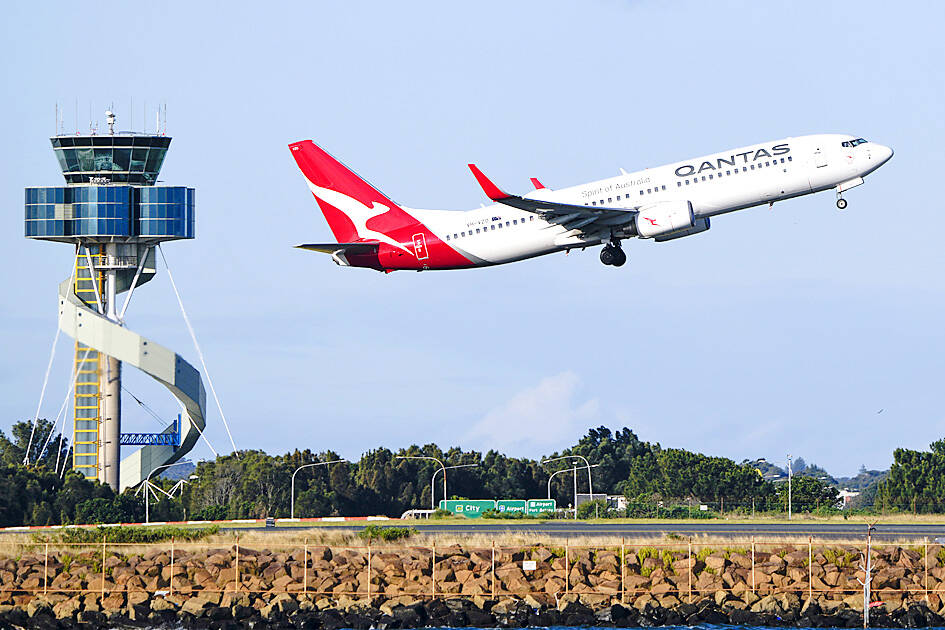Australia’s Qantas Airways Ltd agreed to pay A$120 million (US$79 million) to settle a regulator lawsuit over the sale of thousands of tickets on already canceled flights, in an attempt to end a reputational crisis that has engulfed the airline.
The company is to split A$20 million between more than 86,000 customers who booked tickets on the so-called “ghost flights” and pay an A$100 million fine instead of defending the lawsuit that it had previously vowed to fight, Qantas and the Australian Competition and Consumer Commission (ACCC) said on Monday.
The fine is the biggest ever for an Australian airline and among the largest globally in the sector, although some Australian banks and casino operators have faced higher penalties for breaches of the law.

Photo: AP
“We recognize Qantas let down customers and fell short of our own standards,” Qantas chief executive officer Vanessa Hudson said in a statement.
The settlement “means we can compensate affected customers much sooner than if the case had continued in the Federal Court,” Hudson said, who started her role in September last year, adding that the court still must sign off on the settlement.
If the court approves, the settlement would resolve a dispute that had featured prominently at a time when Qantas’s brand value tanked in consumer surveys amid a spike in complaints about cancellations. After the ACCC filed its lawsuit in August last year, Hudson’s long-serving predecessor, Alan Joyce, brought forward his retirement.
“This penalty ... will send a strong deterrence message to other companies,” ACCC Chair Gina Cass-Gottlieb said in a statement.
However, the payout would pale against the A$1.47 billion net profit that analysts on average forecast Qantas to report in the year to the end of June, London Stock Exchange Group data showed.
People who bought tickets on non-existent domestic flights would get A$225 and people with international fares would get A$450, on top of a refund, the airline and regulator said.
Qantas is still waiting to learn how much it must pay nearly 1,700 ground handling staff it sacked in 2020 after a court found the job cuts were illegal since they were intended to stop industrial action.
The ACCC lawsuit centered on the months after Australia’s border reopened in 2022 following two years of COVID-19 restrictions, and airline cancelations and lost luggage complaints spiked globally amid staffing shortages.
Qantas had said that it faced similar challenges to airlines around the world, but the ACCC said its actions broke consumer law, as it sometimes sold tickets to flights weeks after they were canceled.
Cass-Gottlieb said that the settlement included a promise from Qantas not to repeat the conduct.

Semiconductor business between Taiwan and the US is a “win-win” model for both sides given the high level of complementarity, the government said yesterday responding to tariff threats from US President Donald Trump. Home to the world’s largest contract chipmaker, Taiwan Semiconductor Manufacturing Co (TSMC, 台積電), Taiwan is a key link in the global technology supply chain for companies such as Apple Inc and Nvidia Corp. Trump said on Monday he plans to impose tariffs on imported chips, pharmaceuticals and steel in an effort to get the producers to make them in the US. “Taiwan and the US semiconductor and other technology industries

A start-up in Mexico is trying to help get a handle on one coastal city’s plastic waste problem by converting it into gasoline, diesel and other fuels. With less than 10 percent of the world’s plastics being recycled, Petgas’ idea is that rather than letting discarded plastic become waste, it can become productive again as fuel. Petgas developed a machine in the port city of Boca del Rio that uses pyrolysis, a thermodynamic process that heats plastics in the absence of oxygen, breaking it down to produce gasoline, diesel, kerosene, paraffin and coke. Petgas chief technology officer Carlos Parraguirre Diaz said that in

SMALL AND EFFICIENT: The Chinese AI app’s initial success has spurred worries in the US that its tech giants’ massive AI spending needs re-evaluation, a market strategist said Chinese artificial intelligence (AI) start-up DeepSeek’s (深度求索) eponymous AI assistant rocketed to the top of Apple Inc’s iPhone download charts, stirring doubts in Silicon Valley about the strength of the US’ technological dominance. The app’s underlying AI model is widely seen as competitive with OpenAI and Meta Platforms Inc’s latest. Its claim that it cost much less to train and develop triggered share moves across Asia’s supply chain. Chinese tech firms linked to DeepSeek, such as Iflytek Co (科大訊飛), surged yesterday, while chipmaking tool makers like Advantest Corp slumped on the potential threat to demand for Nvidia Corp’s AI accelerators. US stock

SUBSIDIES: The nominee for commerce secretary indicated the Trump administration wants to put its stamp on the plan, but not unravel it entirely US President Donald Trump’s pick to lead the agency in charge of a US$52 billion semiconductor subsidy program declined to give it unqualified support, raising questions about the disbursement of funds to companies like Intel Corp and Taiwan Semiconductor Manufacturing Co (台積電). “I can’t say that I can honor something I haven’t read,” Howard Lutnick, Trump’s nominee for commerce secretary, said of the binding CHIPS and Science Act awards in a confirmation hearing on Wednesday. “To the extent monies have been disbursed, I would commit to rigorously enforcing documents that have been signed by those companies to make sure we get